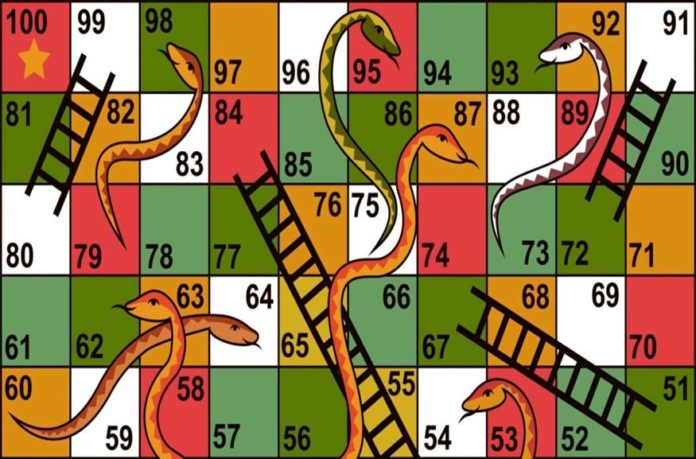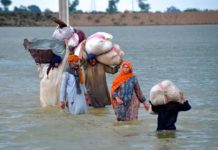Disclaimer: The Eqbal Ahmad Centre for Public Education (EACPE) encourages critical and independent thinking and believes in a free expression of one’s opinion. However, the views expressed in contributed articles are solely those of their respective authors and do not necessarily reflect the position or policy of the EACPE.
We are seventy years old—the Lord be praised. For most nation states, the age of innocence would have long passed by now. Having shed their baby fats by the time they reach this age, nations are supposed to have developed strong limbs, a healthy body and a powerful brain to command the body and limbs into efficient and productive actions. Also around this age, most nation states would have firmly established where they stand and where they are going.
What happened to us along the way? Where are we headed? Why do we frequently find ourselves between a rock and a hard place? If a civilian rule is the norm for most other nations, why does the Khaki intervene so regularly in Pakistani governance? If the Khaki does intervene, why doesn’t it continue for good making it the rule rather than the exception? Why is it that people are, in the end, as fed up with the military rule as its civilian predecessor? If democracy is that universal cure-all medicine for most other contemporary nations, why doesn’t it work in Pakistan?
What Exactly is the Problem?
Pakistan’s problem, exactly, is: “The military intervenes regularly and interrupts the civilian governance with a disturbing frequency.”
Why does the Pakistan Army intervene in civilian governance? The simplest answer to this question is — BECAUSE IT CAN.
Pakistan Army has neither descended from Mars, nor sent in by the Chinese on loan, nor is raised from men reared in an incubator. It very much comprises of men drawn from a cross-section of Pakistani society cherishing the same ideals, having the same tastes, norms, mores, ethos, and morals.
One can find a banker, a businessman, a doctor, an army officer and, sometimes, even an odd politician in the same family. The Pakistan Army, therefore, values the same ideals, is inspired by the same issues, and in the same way, as the rest of the nation. It is, in short, a chip off the same block.
Militaries the world over are essentially alarmists by nature. Pakistan Army is no exception. Yet due to the self-believed final-saviours role, the swiftness with which it reacts to any real or imaginary threat to national security is singularly unique.
Furthermore, Pakistan Army is the largest single organization having its own transportation, communications, health, accommodation, and a host of other mini-systems. It is, in a way, a complete sub-society in its own rights. The only unique distinguishing factor is that of military discipline, a woefully lacking feature in the otherwise larger Pakistani society. It, therefore, tends to have a blowback effect on its larger parent body.
Like any other army, Pakistan Army too has been entrusted with the task of guarding its frontiers. This is sometimes taken to mean guarding all geographical and ideological frontiers…a debatable point at best. The thoroughly modern army is seen as the final saviours by the illiterate multitudes that inhabit this country. Over a period of time, the Pak army has not only started to believe in such a role for itself, it has started to relish it too.
Militaries the world over are essentially alarmists by nature. Pakistan Army is no exception. Yet due to the self-believed final-saviours role, the swiftness with which it reacts to any real or imaginary threat to national security is singularly unique. Above all, Pakistan Army has the gun and their civilian counterparts have none.
So in a single sentence it can be said that Pakistan Army is the largest single, well disciplined, armed organization entrusted to guard the somewhat elusive frontiers of a nation whose pains and tribulations it shares.
Field Marshal Ayub Khan was the man who led the first intervention of Pakistan Army in the civilian governance of the time. There was a palpable sense of relief in a nation gone sick of the ‘crafty politicians’ and their intrigues.
In the following four decades of intermittent military rule the Pak Army continued to draw a few lessons for itself. These are:
– All politicians without exception are cunning, greedy and corrupt to the bones. The governance of the country, therefore, could not be left to the politicians alone.
– The people of Pakistan look up to Pakistan Army as the final saviours. As that is the ultimate truth, the world opinion can cool its heels.
– It is good to be the kings.
Let us take a brief look at a typical political-military cycle of governance in Pakistan.
The single most frequently cited raison d’être for the military intervention, save for the last time when the civilian rulers were blamed for criminal intent first, has been the ineptitude and corruption of politicians.
Even in the last intervention corruption of politicians ultimately came to ride in the forefront of all theories put forward as justifications. In the sporadic civilian rules, the politicians would tend to hit the gravy train with a vengeance. While the Khaki would wrap up its possibly objectionable activities in blankets of national security, there was no such luck for their civilian counterparts.
Devoid of a sacrosanct cover, and not sure of the time the khaki would give them, the in-power politicians would simply dive headlong into the national coffers and go berserk. This would be a frantic and highly visible activity on the otherwise placid national scene. To ward off the intervention of an army that can and will intervene, the politicians should have been focusing their energies on making and sustaining strong sturdy institutions.
Additionally, it is a universal fact that the militaries the world over, Pakistan Army being no exception, are interested mostly in strengthening their own institution. This reality should further urge the politicians to, at the minimum, strengthen existing institutions if not model new ones – institutions e.g. a strong and independent judiciary, that could act as bulwarks against military intervention. They, instead, end up attacking these very bodies in the brief respites that they give themselves from robbing the nation blind.
Stories of Zardaris and their cronies making sickeningly large fortunes in less time than one can say the word dollar would start doing the rounds in the army mess halls. The nation too would be abuzz with the dizzying tales of unbelievable gluttony and naked nepotism of these politicians. Truth would become a first casualty as usual and perceptions would be all that matter. People would start sending agitated signals to the military. Even the out of power sycophants amongst the politicians would start clamouring for military intervention.
The military, with the all-too-convenient self-drawn lessons etched on its mind, would willingly read much that is not there in these calls. It would watch for a while, let the stew bubble up to a point just below eruption, and then bring down the axe with a loud thud of moral righteousness. The scavengers would be caught with the gravy almost running down their chins. Accountability would become the prime exhortation of the ‘saviours’. A lot of fleeing, nabbing, and prosecuting would be seen by the galleries.
Soon, however, the dust would settle down. The Allah Dads and Gul Mohammads would once again get busy in search of three square meals. For a while it would be back to normalcy, or whatever its Pakistani equivalent.
Over time, the politicians too drew a few lessons for themselves. These are:
– The military can and will intervene. It is watching their each and every move with malicious intent. It is only a matter of time before they intervene again. So concentrate hard on refining the art of plunder. The institutions, in the meanwhile, can take a walk.
– The military has the biggest gun in the country. Hate it for that and off-set this vital shortfall by wile, cunning, fraud and subterfuge.
– It is good to be the kings but it is oh-so-short.
The military, in the meanwhile, would get down to enjoying the pleasures of the king’s role in real earnest. Along the way, and contrary to what the politicians do, they would add further muscle to their own institution with better arms, permanent placement of own men in strategic governmental appointments, and insertion/deletion of vital clauses in the constitution for longevity of military rule.
Before long the military too would start suffering from visibility problem of its own-albeit a little different. They would deluge the state machinery with a tidal wave of men in khaki. Railways, WAPDA, communications, transportation, media, sports, education, police, national financial institutions, municipalities, bureaucracy, town planning, various state administrative setups etc. etc. would start overflowing with serving and retired khakis.
Initially these men would serve with a typical military zeal and spirit. Having essentially the same values as the rest of the nation, soon a similar ratio of rogues amongst them would start indulging in the very same activities they once blamed their civilian counterparts for. After a while, despite layers of secrecy, for every Zardari the military would start throwing up its own Mansoor-ul-Haq.
Likewise, the military too would be right on track in practicing the fine art of nepotism. The nation would spot their progeny gorging itself on the ill-gotten fruits in plain sight. Once again a wave of discontent would wash over the nation. International opinion too would start to make distracting noises for democracy.
At this stage the military would get into a standard dilemma. How to, or whether to, get back into the long vacant barracks? The military would start to thrash exit strategies with feverish urgency. It would then start considering bringing in the discarded, but all too willing, politicians as a façade for democracy. It would be afraid of dismounting the tiger that it rode because the tiger was not theirs to ride in the first place. In their hasty and disorderly retreat, and to cover their unlawful riding of the tiger once they dismounted, the military would leave behind a worse lot of politicians than the ones they booted out.
Each party would get back to its primary role for a short period of time and re-read their lessons. After a brief interval the whole revolting cycle would, once again, start its sickening repetition. This is how a typical political-military governance cycle goes in Pakistan. Ironically, the nation in whose name this tug-of-war goes on remains a silent bystander figuring nowhere in the scheme of things.
The root cause of the problem, then, is inept politicians and a heavily armed military that deeply mistrusts civilian governance. In the absence of strong institutions and an intrinsic check on the misrule of the politicians the military finds it only too easy to intercede whenever it wants to. As a matter of fact Pakistan army has evolved as an alternate political force wooing the same very nation for approval that the politicians do.
Blame game notwithstanding, both the military and the politicians have contributed in equal measures to the present state of perfidy.
The Solution
No viable solution can be applied to an intractable problem unless the parties to the problem move from their stated positions. The contending parties are the politicians who are supposed to be representing the nation, but we know better than that. The army whose sole job should have been defense of the borders, but again we know better than that. The nation, of course, is a helpless on-looker.
For any solution to click, the prerequisites will have to be present. For an ideal democracy to work we should have politicians whose majority stands tall, upright and capable of delivering. We should also have educated citizenry able to use the power of vote for the societal good at large while spawning high caliber future politicians in its womb in the meanwhile. As for upright politicians in our country, the pen wavers while putting two such words together. And the present state of national literacy is a story foretold. As both prerequisites are non-existent at the moment, let us forget about the concept of ideal democracy for a while.
On the other hand, we could disband the army, take away their gun or carry out gene therapy on its governance taste buds. We cannot do without an army for the present and none has ever heard of an army minus the guns. While the penchant that the military has developed for governance in the last few decades may wane in time, there is no such hope for the immediate future. History cannot be undone and the old hands are still around. For a workable solution, therefore, both the military and the politicians will have to move from their avowed position of reciprocal suspicion and fixated postures.
No sooner did the life of the father of the nation end, we have been bandied about ad nauseam. From sick, debilitated politicians to greedy, power-hungry Generals it has been one nightmare of a journey for this ideological nation state.
A half way measure will have to be accepted as a stop-gap means. The concept of ideal Western style democracy will have to be put on the back-burner for a while. Both parties will have to accept mutual checks and balances; the politicians on their tendency to melt within the general vicinity of state treasuries and the military on its propensity towards intervention. The sole aim all this while should the continuity of civilian governance, with the military in a close and constitutional tandem, so that it can formulate and pursue policies without fear of interruption. Policies with the aim of so educating the nation that it can in, let us say, 20 years’ time throw up a mass of educated electorate who can choose what is good for them and their society. And while that is happening each will have to unlearn, if that can be done, the self-drawn lessons.
The military will have to realize that military interventionism is in fact obsolete. That the occasional overtures of the world powers are pregnant with self-serving sycophancy. That the Western leaders burst out laughing no sooner they close the doors after seeing off a visiting military tinpot ruler. They will have to learn that the ineptitude of politicians, and their love of greenbacks, is a universal phenomenon and not singularly unique to the Pakistani lot.
And that in their own ranks too there are villains who will match if not surpass the greed of these politicians. They will have to wash away the pleasant memories of the heady days of the Khaki Raj and dampen their enthusiasm of using the sledgehammer at the slightest of provocations. They will have to concentrate on the art of soldiery and realize that skills honed in developing housing societies and producing breakfast cereals are worthless in a battlefield.
Likewise, the politicians too will have to smarten up their act and catch up on the fact that the nation they wish to rule has no further patience for their antics. A capable, honest and delivering politician cannot be removed by even the highest caliber guns of the land as was proven not long back in Venezuela. President Chavez was carried on shoulders by his people and put back in his office despite the sole superpower openly backing the Venezuelan military putsch.
The politicians must hit the history books and remember what the French peasantry did to the people with soft hands at the gates of Paris in the French Revolution. They hung them by their necks from the nearest trees for never having put an honest day’s labor with those hands.
No sooner did the life of the father of the nation end, we have been bandied about ad nauseam. From sick, debilitated politicians to greedy, power-hungry Generals it has been one nightmare of a journey for this ideological nation state.
In the Pakistani landscape, the dictators emerged in all colors ranging from Khaki to whites and in attires from Generals’ tunics to sherwanis and pinstripe suits. They led this gullible nation down blind alleys waving banners of democracy, theocracy, basic democracy, peoples’ empowerment, housing, clothing, and what you have. Some had no such patience for these verbal mirages and enforced plain despotic rules. The common Pakistanis believed in them and their promises. They were promised better tomorrows. Sunny days in flowery gardens free of darkness and misery. Days when they and their progeny would live in a happy present with sights set squarely at a promising future.
In return, these leaders only wanted a little more sacrifice from Pakistanis. They went with them all the way merrily carrying their impoverished bodies to whatever altar of sacrifice was appointed. The promised sacrifices would always be exacted in full and then some more. The promised gardens, however, would be nowhere nor sunshine nor any silver lining on the dark horizons of Pakistanis’ wretched existence. The messiahs would disappear into far off lands after having raped their innocence. The nation would lie prone bleeding profusely from wounds inflicted with a careless abandon.
Time for other messiahs to appear then? Are they here after all? Is this game of snakes and ladders finally going to be over? Is there hope?
Is anyone listening?
About the Author:
 Anwaar Hussain is an ex F-16 fighter pilot from Pakistan Air Force. A Masters in Defense and Strategic Studies from Quaid-e-Azam University of Islamabad. He now resides in Canada. He started writing as a hobby some years back and has, since then, published a series of articles in The Pakistan Tribune, The Baltimore Chronicle, Defense Journal and a host of other prestigious publications and web portals. Other than international affairs, Anwaar Hussain has written extensively on religious and political issues that plague Pakistan.The reason for taking up the pen, in his own words, is, “For years I had been watching lies being peddled as truths in the name of God, king or country. I always felt that truth needed no crutches for it has neither a religion nor a nationality. It owes its loyalty only to its own unadulterated self. May the truth be our companion.” He can be contacted at airdance@outlook.com
Anwaar Hussain is an ex F-16 fighter pilot from Pakistan Air Force. A Masters in Defense and Strategic Studies from Quaid-e-Azam University of Islamabad. He now resides in Canada. He started writing as a hobby some years back and has, since then, published a series of articles in The Pakistan Tribune, The Baltimore Chronicle, Defense Journal and a host of other prestigious publications and web portals. Other than international affairs, Anwaar Hussain has written extensively on religious and political issues that plague Pakistan.The reason for taking up the pen, in his own words, is, “For years I had been watching lies being peddled as truths in the name of God, king or country. I always felt that truth needed no crutches for it has neither a religion nor a nationality. It owes its loyalty only to its own unadulterated self. May the truth be our companion.” He can be contacted at airdance@outlook.com








